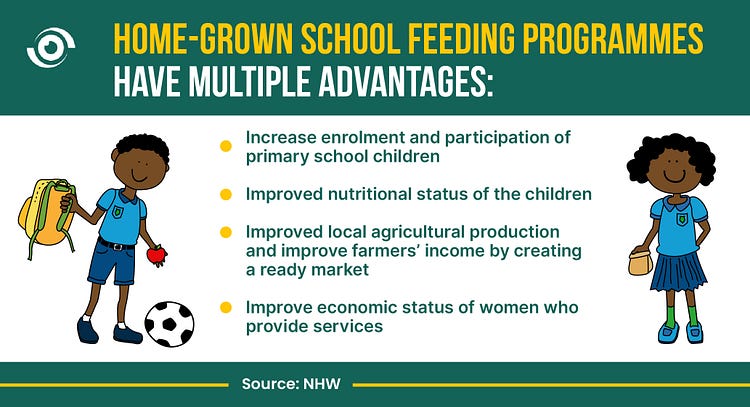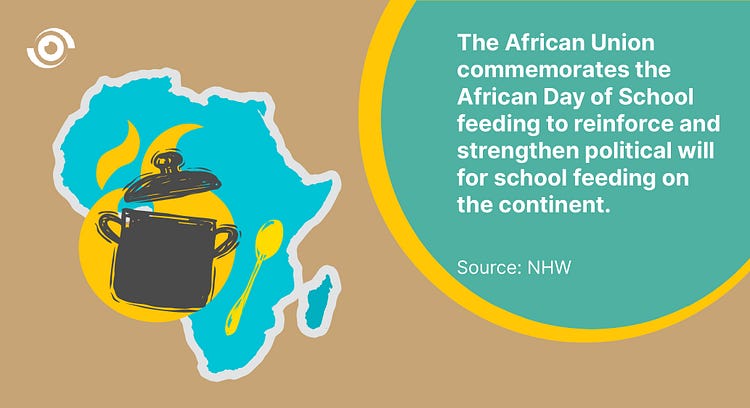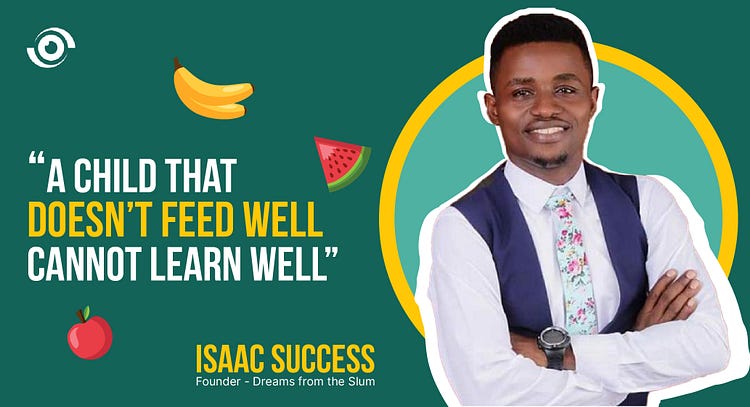“A child that doesn’t feed well cannot learn well”. Isaac Success, Dreams from the Slum.
Isaac Success is the founder of Dreams from the Slum, a community-based organisation operating out of Ajegunle in Lagos State. Success went to school without food and his experience inspired him to add a school feeding program to the tuition-free school supported by his organisation in the community. “I understand how it feels. Sometimes we think that some kids are dull. They are not dull, but can’t learn without food,” he said.
Poor nutrition in children is a global problem that affects Nigeria. Additionally, Nigeria struggles with poor school attendance, with an estimated 10.5 million of the country’s children aged 5–14 years out-of-school. Insecurity and attacks on educational institutions, especially in northern Nigeria are possible causes, but lack of access to good nutrition is also a contributing factor. Some children are unable to attend school because they have no access to a meal or cannot get all the meals required in a day for their healthy growth. Some of them are forced to do odd jobs to earn just one meal.
School feeding programs to the rescue
There are many strategies to combating poor nutrition in children such as infant and young child feeding (IYCF) interventions, micronutrient supplementation and in situations where children become acutely malnourished, Community-based Management of Acute Malnutrition (CMAM). The school feeding strategy is however unique as the benefits are two-sided — it addresses malnutrition while encouraging school attendance and good education outcomes. Both are important for a country’s development.

School Feeding programs are a global practice. The National Food Lunch Program in the United States for instance served over 4.8 billion lunches to children nationwide. The Ghana School Feeding Programme aims to reduce hunger and malnutrition, increase school enrolment, attendance and retention, and boost domestic food production in deprived communities in the country. The Kenyan government started a national home-grown school feeding programme to provide meals to children at school in 2009. This helped support academic achievements as well as stimulate local agricultural production through purchase of food from smallholder farmers and local food suppliers. As of 2016, the programme, with support from the World Food Programme, has provided hot lunches, every day of the school term to 1.5 million school children across the country. South Africa has the National School Nutrition Programme initiated by the government. The objective is to provide nutritious meals to children in primary and secondary schools in poor communities to improve their ability to learn.
In Nigeria, the TY Danjuma Foundation has supported local organisations to design and implement similar programs. The federal government’s home-grown school feeding program (HGSFP) that started as a social investment intervention also set out to achieve similar objectives. It is now managed under the aegis of the Federal Ministry of Humanitarian Affairs, Disaster Management and Social Development.
Success’ program employs a different approach. His team depends on community members who believe in their vision “because they see what we do so the support just comes”. While the model raises concerns around sustainability, he said they have run it for two years. With the donations that come into their food bank, they are able to plan a schedule of feeding for the students to ensure they have balanced meals. Trust and transparency are key factors that ensure they continue receiving support. One of such support is from the council manager of Ajegunle local government who provides continuing support for all meals served, one day a week, on a Monday in the school.

A subtle difference that makes a difference
Unlike other school feeding programmes, home-grown school feeding models add an additional benefit of promoting ‘local’ economic growth and social protection or poverty reduction objectives. Emphasis is put on using crops from local farmers to prepare meals thereby giving them enhanced access to more stable markets for their products.
Recognising its importance, every year since 2016, the African Union (AU) commemorates the African Day of School Feeding to reinforce and strengthen political will for school feeding on the continent. The 2021 edition held on March 1 focused on “Harnessing Africa’s Traditional Knowledge and Food to Support Home-Grown School Feeding Programmes and Systems During COVID-19 Response and Beyond”. It recognises the importance of using locally available alternatives to address malnutrition in the continent. According to a statement by the AU, the event helps convene stakeholders across the public, private, civil society, and multilateral sectors to raise awareness and knowledge on school feeding. Such high-level events provide an opportunity to take stock of progress made and galvanise political support for adoption, implementation and sustaining of school feeding policies and resources across the continent.

Beyond a meal
Sustaining school feeding programs can be threatened by lack of funds. But its benefits to both citizens and the nation should inspire the public and private sectors to be deliberate about funding it. Mrs Onyinyechi Uzoma was recruited under the government’s home-grown school feeding program in Imo State. In 2019, she cooked the meals for the participating schools in her community until they stopped receiving funds. The opportunity helped her support her family, but now, she has resorted to petty trading, a venture that is cumbersome and less rewarding.
Mrs Francisca Chika, a headmistress in Owerri, Imo State recounted the story of a family with five children who were pupils in a school where she previously taught. “They were always looking malnourished and always happy to attend school to receive the meals even from a few other pupils whose parents instructed not to accept”. Mrs Chika said she noticed an increase in attendance as the pupils who usually skipped some days became consistent. “Some of them come to school without eating so the meals encouraged them to come, and it was a welcome relief for their parents too”. She said there are indications that the program will be continued again as adhoc staff from the ministry visited her school to capture data of her pupils. However, she wants the government to ensure that all students in all the classes receive the meals, as during the last phase, only pupils in junior classes received meals.
Sustaining the gains of the home-grown school feeding program requires putting in place structures that will entrench quality, build community trust and encourage ownership. This was what Action Health Incorporated (AHI) in Ogun State across 60 public schools in four local government areas. They monitored the implementation of the HGSFP to ensure that the food got to the children and funds disbursed to the cooks from the communities were well utilised. “We ensured there were limited leakages in the system, the agreed menus were delivered and in the right quality and quantity,” said the Executive Director, Adenike Esiet, adding that they scaled up monitoring from the initial 60 pilot schools to 320 public primary schools in the four LGAs.

AHI also set up structures that improved accountability in the system because according to Essiet, findings at the onset of their involvement showed community members were not engaged in the process. They brokered direct linkages between the communities benefiting from the programme and the government, making it easier for communities to demand accountability and report inconsistencies. The community watch group they set up empowered community members to participate in the program and provide oversight duties. To ease direct data sharing between the watch group and the state team overseeing the project, AHI developed a web portal for the state.
With accountability mechanisms like this replicated across the country, the gains of the HGSFP can be sustained. Members of the benefiting communities in the diaspora can keep track of what is happening in their communities and possibly provide the necessary support.
With ongoing conversations around the 2022 budget and as the government thinks of areas of human capital development, it is important that we put our money where our mouth is. One strategy to scale school feeding programs is to work with organisations such as Dreams from the Slum who have shown capacity and have an already established structure. This way, the work they are doing is scaled and duplication of efforts is prevented. Doing this also means that the government will focus more on providing policy and legal frameworks, while leaving implementation to local organisations.


